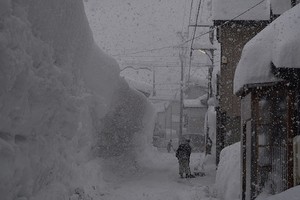By SOSHI KATSUMI/ Staff Writer
November 24, 2022 at 19:15 JST
It took almost 30 years for Japan head coach Hajime Moriyasu to exorcise the demons that have caused him heartbreak at the World Cup.
The Samurai Blue’s stirring come-from-behind 2-1 win over Germany in Japan’s opening Group E match stood in sharp contrast to the misery that has befallen Moriyasu at the sport’s biggest event.
The seeds were planted on Oct. 28, 1993, when Moriyasu was on the pitch in Doha, representing Japan. It was the final match of the Asian Qualifiers for the 1994 World Cup in the United States.
Japan led Iraq 2-1.
But in additional time, Iraq scored a tying goal with a header, dashing Japan’s long-standing dream to qualify for the World Cup.
Moriyasu, nicknamed “Poichi,” was a starting midfielder.
He saw an Iraqi player take on Kazuyoshi Miura. He knew he would be the next to defend his team’s goal.
But Moriyasu felt like he was planted in the ground and he could not move his feet.
He saw the ball flying over his head to tie the game and end Japan’s chances of qualifying. It was like seeing a picture in slow motion, he said.
The next thing he knew, he was sobbing on the balcony of his hotel room. He could not recall what happened after the game.
The game’s ending has been permanently etched in Japan’s national collective memory as “the Tragedy of Doha.”
Amid his grief, Moriyasu said he had an epiphany: “You must win. Otherwise, it means nothing.”
BAD FORTUNE FOLLOWS
After retiring, Moriyasu became a coach and led J.League’s Sanfrecce Hiroshima FC to a league championship three times.
In the 2018 FIFA World Cup in Russia, Moriyasu served as one of the coaches of the national team. There he became part of another “tragedy.”
Japan advanced to the final tournament stage and it got close to making it to the final eight for the first time.
In the first match of the final tournament stage against Belgium, Japan led 2-0 late in the game.
But Belgium unleashed a blistering attack and in extra time, the European powerhouse defeated Japan 3-2, to knock the Samurai Blue out of the World Cup.
Moriyasu watched his players collapsed on the ground in agony, as the loss became known as “the tragedy of Rostov.”
MINDSET TO PLAY WORLD’S BEST
In late July 2018, Moriyasu was named the new head coach of the Japanese national team.
He said the defeat to Belgium was a springboard, and his focus on “winning” remained the same.
A national team staffer described Moriyasu as a “super realist” and things like “capturing the fancy of fans” would be the last thing on his mind.
He has demanded that players acquire two things, a world-class standard and ambition, in order to build a team to break through the "wall of the final 16” at the World Cup.
He has proactively handpicked young Japanese playing and achieving good results in European leagues.
Many of them, including midfielder Ritsu Doan, were aged around 20 at the time they were selected to play for the national team.
Moriyasu told these young players not to “over-respect” world-class competitors and take the approach that they are “on the same level” as those soccer-power nations.
Midfielders with individual talents such as Doan, who plays for SC Freiburg, Junya Ito, who plays for French club Reims, Wataru Endo, who plays for VfB Stuttgart, among others, have lived up to Moriyasu’s expectations and formed the nucleus of the squad.
Moriyasu said he constantly monitored the performances of 50 or more players prior to the selections.
He checked games held overseas and traveled around Europe a few times a year to see players in action.
The Japan Football Association has set up an office with resident staff in Dusseldorf, because many Japanese players play in the Bundesliga.
The intention was to help create an easier environment for these players and also keep providing them inspiration.
Such efforts proved fruitful in 2020 when Japan placed strict border restrictions to stop the spread of COVID-19 and traveling was difficult.
Moriyasu could assemble a national squad only with the players based in Europe for scheduled friendly matches.
Under his leadership, however, the national team struggled to qualify for the Qatar World Cup.
Frustrated fans demanded that Moriyasu be fired on social media in fall 2021.
At the time, Moriyasu had dinner with his former teammates who survived the 1993 tragedy together.
Moriyasu was more of a supporting character of the team full of superstars, such as “King Kazu” Miura, Nobuhiro Takeda and Ruy Ramos.
But they gathered at a restaurant for him.
“All of us, the Doha crew, are rooting for you,” they said.
Moriyasu said he was inspired by their encouragement.
After his team qualified for the Qatar World Cup on March 24, Moriyasu said, “The World Cup is a goal and a dream for me, our players and staff. And it is a dream stage for our supporters and all of those who have supported the national team.”
‘FIGHT TO WIN’
On Nov. 1, Moriyasu announced the Japanese 26-man squad for the Qatar World Cup. Of the 26, 19 players were chosen to represent Japan at the World Cup for the first time.
Moriyasu said he chose the players because he placed his hopes in their “ambition that they want to be successful at the World Cup.”
For Moriyasu, who almost made it to the pitch as a player but never reached that dream, being placed in the tough Group E that included past champions Germany and Spain was perfect.
“You don’t often get a chance to play against former world champions--Germany and Spain,” he said excitedly.
On the evening of Nov. 23, Moriyasu, 54, was on the pitch in Doha once again.
He watched his players collapsed on the ground, but this time in joy over a dramatic 2-1 upset victory over Germany, a four-time World Cup champion.
“Players and staff worked as one, prepared well and fought tenaciously. That led to a victory,” Moriyasu said.
He then thanked the many Japanese supporters in the stands and at home watching on TV.
“But it’s just one game,” Moriyasu said. “We will review what we did today, get ready for the next one and fight to win.”




















A peek through the music industry’s curtain at the producers who harnessed social media to help their idols go global.
A series based on diplomatic documents declassified by Japan’s Foreign Ministry
Here is a collection of first-hand accounts by “hibakusha” atomic bomb survivors.
Cooking experts, chefs and others involved in the field of food introduce their special recipes intertwined with their paths in life.
A series about Japanese-Americans and their memories of World War II